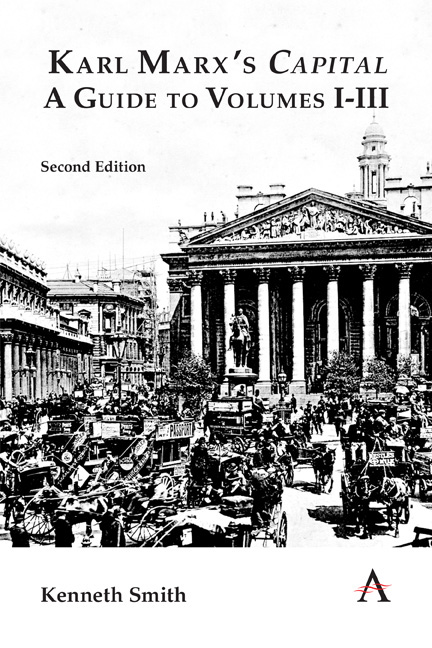Book contents
- Frontmatter
- Dedication
- Contents
- Preface to the Second Edition
- Introduction
- Part I The Development of the Capitalist Mode of Production
- Part II The Capitalist Mode of Production
- Part III The Underdevelopment of the Capitalist Mode of Production
- Part IV The Value Theory of Labour
- Conclusion to Part IV
- Conclusion
- Appendix: On Social Classes
- Notes
- Bibliography
- Index
7 - Simple Reproduction in Capital, Vol. II, Sections 1–8
Published online by Cambridge University Press: 17 April 2021
- Frontmatter
- Dedication
- Contents
- Preface to the Second Edition
- Introduction
- Part I The Development of the Capitalist Mode of Production
- Part II The Capitalist Mode of Production
- Part III The Underdevelopment of the Capitalist Mode of Production
- Part IV The Value Theory of Labour
- Conclusion to Part IV
- Conclusion
- Appendix: On Social Classes
- Notes
- Bibliography
- Index
Summary
Marx's discussion of simple and extended reproduction in Capital, Vol. II begins with a rather long-winded discussion of simple reproduction and circulation in Chapter 17 (1974b, 329–48 [1978, 399–418]) and then a very brief discussion of extended reproduction (1974b, 348–54 [1978, 418–24]). However, this discussion (which basically focuses on the question of the money-supply necessary for circulation to take place) is of very limited interest to us here, and really only needs to be studied in any detail at all if one is interested in Rosa Luxemburg's claim that a third department of production is required to produce the means of exchange (Luxemburg 1963, 99–103).
Of much greater interest to us here is Marx's discussion of simple and extended reproduction in Chapters 20 and 21 of Vol. II. This is the famous Department I (DI) and Department II (DII) discussion of the reproduction of the total social capital of society, rather than of any individual or particular capital, as was the case with Marx's discussion of simple and extended reproduction in Capital, Vol. I. Once again these two chapters are composed of a very long discussion of simple reproduction (in Chapter 20) and a very much shorter and rather more to the point discussion of extended reproduction (in Chapter 21). Fortunately it is not necessary for our purposes to look at both of these chapters in detail here. We will look at Chapter 21 (1974b, 493–527 [1978, 565–99]) in some detail in Chapter 8 of this study, but even then it is not necessary to read it all. While Chapter 20, section 13 (1974b, 484–92 [1978, 556–64]) is a completely uninteresting discussion of Destutt de Tracy's theory of reproduction which, in my opinion, might well have been included by Engels in the book which is now know as Theories of Surplus Value – sometimes also called the fourth volume of Capital – without losing anything from Marx's discussion of simple reproduction in Vol. II. It would also be possible to omit without losing anything from Marx's discussion of simple reproduction in Vol. II Marx's equally uninteresting discussion of the Physiocrats and Adam Smith in Capital, Vol. II, Chapter 19, entitled ‘Former Presentations of the Subject’ (1974b, 363–95 [1978, 435–67]).
- Type
- Chapter
- Information
- Karl Marx's 'Capital': A Guide to Volumes I-III , pp. 55 - 59Publisher: Anthem PressPrint publication year: 2021



